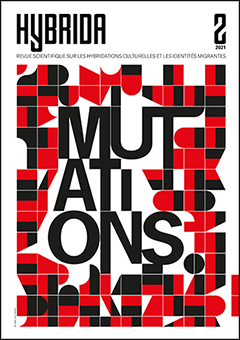The encounter between Moroccan and French culture and its impact on the Moroccan folk tale
DOI:
https://doi.org/10.7203/HYBRIDA.2.20652Keywords:
Storytelling, interculturality, cultural hybridity, oral performance, rewriting Abstract
Abstract
This article studies the features of a cultural hybridity, noted during the presentation of a Moroccan tale revisited, within the framework of an international festival of tale, organized in France. We show in the first part that in order to meet the requirements of this notion, the storyteller used symbols recognizable by the audience and other features that have an almost similar meaning in his original culture and in that of the host country. The second part shows that just like the text, the gestures, the costume, the management of the space and even the duration of the tale were subjected to the particularity of this intercultural context. In the last part, we describe that in spite of the efforts made by the storyteller to build a bridge between his culture and that of his audience, linguistic and semantic constraints are imposed at the time of the narration.
 Downloads
Downloads
 References
References
Allouche, A. (1993). Les métamorphoses d’un conte maghrébin dans l’immigration. Hommes et Migrations (1161), 25-28. https://doi.org/10.3406/homig.1993.1952
Amahan, A. (1996). Le costume traditionnel. In M. Sijelmassi, A. Khatibi, & E.-H. El-Moujahid (dirs.), Civilisation marocaine : arts et cultures (pp. 212-219). Éd. Oum.
Ben Rejeb, R. (1994). La culture au Maghreb sa transmission à travers contes et prénoms. Ibla, 57(1994), 219-240.
Bouderbala, S. (2019). Le Prophète et ses femmes. L’Histoire (458), 32-57. https://www.lhistoire.fr/le-proph%C3%A8te-et-ses-femmes
Bovin, C. (2005). Taureaux, vaches sacrées, vaches folles : de la préhistoire à la corrida. Le Plein Des Sens.
Chebel, M. (1995). Dictionnaire des symboles musulmans. Albin Michel.
Chevalier, J. & Gheerbrant, A. (1982) Dictionnaire Des Symboles Mythes, Rêves, Coutumes, Gestes, Formes, Figures, Couleurs, Nombres. Robert Laffont et Jupiter.
Clanet, C. (1993). L’interculturel, introduction aux approches interculturelles en éducation et sciences humaines. Presses Universitaires du Mirail.
Dasen, P. R. & Retschitzki, J. (1989). Recherches interculturelles : Une association, un colloque. In C. Clanet (Éd.), Socialisations et cultures (pp. 9-16). Presses Universitaires du Mirail.
Geoffroy, Y et Geoffroy, N. (2000). Le livre des prénoms arabes. Al-Bouraq.
Hutnyk, J. (2005). Hybridity. Ethnic and racial studies. 28(1), 79-102. https://doi.org/10.1080/
0141987042000280021
Hymes, D. (2015). Breakthrough into performance. Guaraldi.
Kapchan, D. A. (2017), Performance : réénonciation et réincarnation dans les genres de la performance. Cahiers de littérature orale (82), 20-43. https://journals.openedition.org/clo/4159
Pillard, M. (1897). Dictionnaire des symboles, emblèmes et attributs. Henri Laurens.
Roland, H & Vanasten, S. (Éds.) (2010). Les nouvelles voies du comparatisme. Academia Press.
Sauvaire, M. (2012) Hybridité et diversité culturelle du sujet : des notions pertinentes pour former des sujets lecteurs ? Littera-Incognita (4). https://blogs.univ-tlse2.fr/littera-incognita-2/2016/02/16/numero-4-2011-article-3-ms
Shan, B. (2004), La communication interculturelle : ses fondements, les obstacles à son développement. Communication et organisation, 24. https://doi.org/10.4000/communicationorganisation.2928
Yacoubi, E. (2008). L’écriture de soi comme modèle de contestation et d’affirmation de l’individu dans la société marocaine. Chimères, 1(1-2), 315-347. https://doi.org/10.3917/chime.066.0315
Published
How to Cite
-
Abstract741
-
HTML (Français )108
-
PDF (Français )2639
Issue
Section
License
All the documents in the OJS platform are open access and property of their respective authors.
Authors publishing in the journal agree to the following terms:
- Authors keep the rights and guarantee HYBRIDA the right to be the first publication of the document, licensed under a Creative Commons license Attribution-NonCommercial-ShareAlike 4.0 International (CC BY-NC-SA 4.0) that allows others to share the work with an acknowledgement of authorship and publication in the journal.
- Authors are allowed and encouraged to spread their work (once published) through electronic means using personal or institutional websites (institutional open archives, personal websites or professional and academic networks profiles) once the text has been published.



